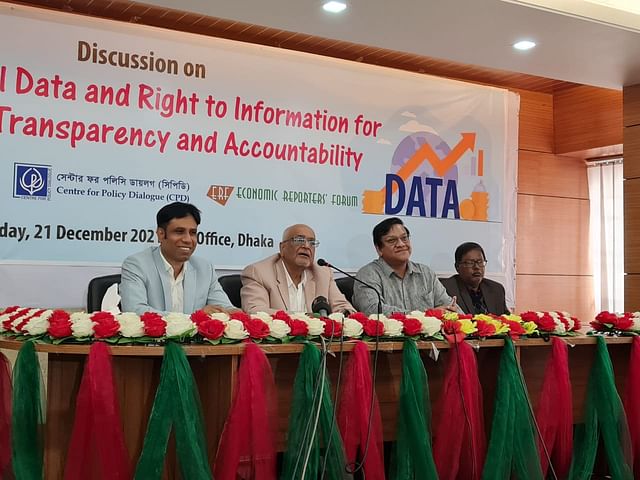Devapriya Bhattacharya, a special fellow at the Center for Policy Dialogue (CPD), a private research institute, said that information blindness was prevailing in the country. He says there was a time when there was a lack of information in the country. Then there is the anarchy of information. After the anarchy there was a dilemma of disclosure of information. And now the age of information blindness is going on. Policy makers no longer realize that information is crucial to development. The country has been plunged into a terrible darkness of information blindness.
He made the remarks at a seminar jointly organized by the Economic Reporters Forum (ERF) and the CPD. The seminar was held at the ERF office of Purana Paltan in the capital on Tuesday. Debapriya Bhattacharya was the keynote speaker at the seminar titled ‘Importance of Budgetary Information and Implementation of Right to Information Act in Need for Transparency and Accountability’. At the beginning of the program, Taufiqul Islam Khan, Senior Researcher of CPD, presented an essay on the need for budgetary information. Senior journalist Sirajul Islam Qadir and ERF general secretary SM Rashidul Islam gave welcome speeches.
Speaking on the occasion, Devapriya Bhattacharya said, “The importance of information as a major contributing factor in the development of developing countries has now become unimportant to policy makers. In this case, there is a kind of indifference even among the political leadership. But the blindness of information is not at all compatible with our modern attitude and development aspirations. Bangladesh is on the way to transition from Least Developed Countries (LDCs). There will be no substitute for information to tackle the challenges that will come after the transition from LDC. We have entered the age of information blindness at a time when we are trying to transition from LDCs. I am aspiring to be an upper middle income country.
Devapriya Bhattacharya thinks that information problem or crisis has been created in the country due to several reasons. Reasons include lack of awareness among policy makers about the usefulness of information, lack of technical capacity in data collection, lack of financial support to use data collection capabilities, lack of financial control, lack of administrative or legal complexity in disclosure and lack of demand for information.
Devapriya Bhattacharya said, “During the Corona period, we have seen the inability to deliver aid to the affected people due to lack of information. Many countries were in financial crisis during the Corona period. But there was no financial crisis in Bangladesh. The big problem was the lack of ability to spend money. The main reason behind this deficit was lack of accurate information. Due to this, it was not possible to distribute the entire amount of assistance given by the Prime Minister for two and a half thousand rupees.
CPD Special Fellow Devapriya Bhattacharya further said, “Many times, in providing information, excuses are given for national security or national interest. But we see that the National Bureau of Statistics is collecting or compiling a lot of data with foreign assistance. Then the national interest is not harmed? ‘
In the main article, Taufiqul Islam Khan said that Bangladesh is deteriorating in the global open budget index. In 2016, Bangladesh was ranked 41st in this index. And in 2019, it dropped further to 36. Declining position on the index means deteriorating conditions. The desire of people to know revenue or economic information is not being fulfilled. Many times information is not available under the Right to Information Act. Again, there is a big gap in the credibility of the information.




